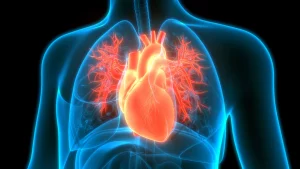This is how the AI article summary could look. Lorem ipsum dolor sit amet, consectetur adipiscing elit, sed do eiusmod tempor incididunt ut labore et dolore magna aliqua. Ut enim ad minim veniam, quis nostrud exercitation ullamco laboris nisi ut aliquip ex ea commodo consequat.
10 Most Common Heart Disease Symptoms

Here are the 10 most common heart disease symptoms:
1. Chest Pain
A classic sign of a heart attack (myocardial infarction) – characterised by a rapid onset of heaviness, tightness or pressure in the chest, often described as ‘an elephant’ or ‘a tight band’. It often radiates down the left arm, or into the neck or back. If the pain doesn’t stop within 20 minutes of resting, dial
999.
Note. Sometimes pain from the heart doesnt primarily affect the chest. It can present as pain like indigestion, or pain in the upper central abdomen. If unsure, call NHS
111 for advice.
2. Arm, Jaw or Back Pain
Chest pain that spreads to other parts of the body, such as the arm, jaw, neck or back, can be a sign of a heart attack. But it can also start in those areas. Seek immediate medical attention if the pain doesn’t go away.
3. Feeling Sweaty and Sick
Feeling hot and clammy, and/or sick (and even vomiting) along with chest pain, can be a sign of a heart attack. Call
999 if you experience these symptoms.
4. Collapse or Fainting
This can be a presentation of tightened aortic valve (called aortic stenosis), low blood pressure due to heart failure or a slow abnormal heart rhythm (e.g. ‘slow AF’; see point 9 below). See a doctor soon if you collapse or faint for no apparent reason, three times or more.
5. Shortness of breath
Shortness of breath (SOB) can be a marker of heart failure, especially if it comes on when you lie down at night (called orthopnoea). If SOB comes on rapidly when you are asleep, its called paroxsymal nocturnal dyspnoea. See a doctor soon if you get these symptoms.
Note. There are causes of SOB that are not caused by heart disease. For example, it can be due to advanced chronic kidney disease (CKD), nephrotic syndrome (another kidney condition), liver or lung failure.
6. Swollen Ankles
Swollen ankles can be a sign of heart failure. See a doctor soon if you get this symptom.
Note. The (non-heart) causes of SOB described above, can also cause ankle swelling.
7. Leg Pain
A gripping, cramping sensation in the calves when walking can be a sign of peripheral vascular disease (PVD) – also called peripheral arterial disease (PAD). It is due to a tightening of the arteries deep in the leg. It can be linked to heart disease. Consult your GP if you experience this symptom.
8. Extreme Fatigue
Feeling tired all the time can be a symptom of heart failure. If you’re experiencing extreme tiredness without a clear reason, consult your GP.
9. Palpitations
This means rapidly becoming aware of your heartbeat, often feeling like it’s racing and missing beats. It can be due to a irregular heart rhythm called atrial fibrillation (or ‘A fib’ or ‘AF). lf your heart is beating erratically, consult your GP, especially if you experience blackouts.
Note. AF can be fast (‘fast AF’) or slow (‘slow AF’) – see point 4 above.
10. Other Symptoms
Women, older adults, and people with diabetes may have little or no chest pain when they have a heart problem.
